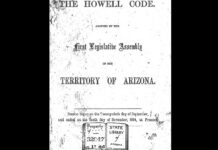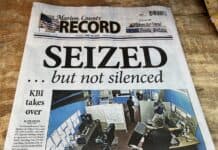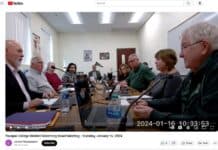
He spoke for just a short time but what he had to say brought an appreciative crowd of nearly 200 to their feet for more than a minute.
Retired U.S. Air Force pilot Col. Thomas Kirk spoke for just 10 minutes but in that time he told of the horrors of being a prisoner of war during the Vietnam War. Kirk was the keynote speaker during a Vietnam veterans-only luncheon on Friday, April 1, at the Elks Lodge, part of the Welcome Home Vietnam Veterans Day celebration.
An only child growing up in Virginia, Kirk worked as a musician while in high school during World War II. After attending the Virginia Military Institute, he was accepted into medical school. But one day he had a change of heart and joined the military. Soon he was sent to flight school despite the fact he had never been in a plane but quickly moved up in rank.
“I couldn’t spell captain but suddenly I was one,” he said, noting that he ended up flying 50 successful bombing missions in the Korean War.
Now, jump ahead a decade.
In 1966, Kirk said the Vietnam conflict was in full swing. He had wanted to go and fight but was stationed elsewhere. So, during a two-week leave he went to Vietnam and flew 25 missions. Not long after he found himself flying F-105s in the skies over hostile jungles of Southeast Asia. He had 66 combat missions but it was the 67th that changed his life.
While leading the largest fighter-bomber raid of the war on Oct. 28, 1967, the 38-year-old’s plane was hit by anti-aircraft fire over Hanoi, North Vietnam. With his ship engulfed in flames, he was forced to parachute from the plane. He was captured right away and would spend the next five-and-a-half years in prisoner of war camps, including the infamous Hanoi Hilton.
“When I got to the prison camp I was badly wounded,” he said. “I couldn’t walk for three months. I had to drag myself around the cell.”
For three days and three nights he was tortured until he said he told his captors what they wanted to hear. From there he was placed in solitary confinement for two years.
“I remember waking up to the worst experience of my life — I wanted to die,” he said. “My family didn’t know for three years whether or not I was dead or alive and I didn’t know if I’d ever go home again. I asked, ‘Why God? What did I do in my life to deserve this? What could I have done differently to dodge those bullets?’ I asked myself this for two solid weeks.”
But after those two weeks he decided that he needed to dig deep within himself if he wanted to survive.
“I was put in a situation where I had no control other than my heart, will to live and my mind,” he said.
In March 1973, Kirk and other prisoners were released at the end of the war. For his combat leadership and heroism he was awarded the Air Force Cross, four Silver Stars, two Distinguished Flying Crosses, nine Air Medals and the Purple Heart.
“At the time, prison camp was the worst thing that happened to me in my life,” he said. “I know this is going to sound odd but today, I can say it was the best that ever happened to me. When I came back I was a better husband and better father. It gave me a better understanding of the difference between the ants and elephants.”
Following retirement from the Air Force in 1978, Kirk made his home in Italy where he became a certified financial planner, doing business with the military, U.S. State Department and civil service employees in Europe.
After successful years in business, in 2009 he moved to Anthem where he still lives with his wife, Ann.
When addressing his fellow veterans, Kirk added, “You gave up everything to put on that uniform and serve your country. Every man and woman who has served should stand up and be proud of that.”


















